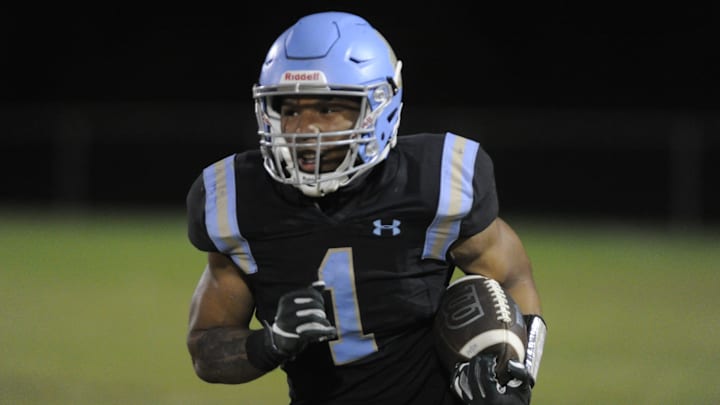Alabama football power Coosa Christian loses two appeals, must sit out the playoffs

The Coosa Christian Conquerors finished as Class 1A state runner-up last football season. But they won’t be in the playoffs at all this year.
The Alabama High School Athletic Association’s (AHSAA) Central Board of Control agreed in a special meeting last Saturday to uphold a District 6 decision to force Coosa Christian to forfeit five games because of an ineligible player and be placed on a postseason ban through the end of 2025, according to a story in the Gadsden Messenger.
Earlier in the week, the AHSAA ruled that the private school had violated the Coaching-Outside-the-Season rule and District 6 upheld that ruling. Coosa Christian then appealed to the association’s Central Board of Control, which upheld the ruling by District 6.
The school earlier in the season was found guilty of violating the Coaching-Outside-the-Season rule and was forced to forfeit its victory against Cleveland High. But, then the AHSAA discovered that Coosa Christian had not fully reported how many games the ineligible player had competed in, forcing the school to forfeit victories against Susan Moore, Falkville, Southeastern and Cold Springs, effectively ending its playoff eligibility.
Coosa Christian had roared to an 9-1 record, 6-0 in Class 2A, Region 6, before the association’s ruling. With the five forfeitures, the Conquerors slipped to 4-6 overall, 1-5 in the region, which placed them sixth out of seven teams.
Only the top four teams in each region advance to the state playoffs. With Coosa Christian out of the picture, the top four teams in the region now are Southeastern (8-2 overall, 6-0 region); Falkville (6-4, 5-1); Susan Moore High School (5-5, 4-2); and Cold Springs (5-5, 3-3).
Coosa Christian took legal action on Monday, filing a lawsuit in the Circuit Court of Montgomery County against the AHSAA and its executive director to reverse the ruling, according to a story in the Gadsden Times. The school is seeking a temporary restraining order to allow participation in the postseason and to reexamine the penalties against the program.
Per the story in the Gadsden Times, Coosa Christian’s lawsuit stipulates that AHSAA executive director Heath Harmon told the school that the association might allow the Conquerors to play in the 2025 playoffs if head coach Mark O’Bryan is not affiliated with the program.
Coosa Christian also is hoping to reverse the five forfeits and void the AHSAA’s ruling that the ineligible player must not play during the first half of the 2025 season.
The private school released an official response to the matter on X:
“This is Coosa Christian School’s response to the allegations and findings by AHSAA Director Heath Harmon for which we have been placed on written notice.
“As a member institution, we can only abide by the rules and regulations as they are written, giving rules their plain meaning in context. Director Harmon provided our institution with notice of alleged infractions on Tuesday, October 29, 2024. In his letter, it was alleged that a Coosa Christian School coach who holds the position of assistant coach on our football coaching staff coached an unnamed student, one of our student athletes, in the activity of ‘athletic development and training’ during an unspecified period last spring while the unnamed student was enrolled as a student at Glencoe Middle School, another AHSAA member institution. On or about April 17, 2024, the unnamed 8th-grade student transferred schools, moving from Glencoe Middle School to Coosa Christian.
“In the fall of 2024, the unnamed student participated in both varsity and junior varsity football for Coosa Christian School. Pursuant to Director Harmon’s letter, the AHSAA determined that the Coosa Christian School coach and the unnamed student violated Rule III Contest, Section 15: Coaching Outside School Year. The rule reads as follows:
‘No administrator, coach or non-faculty coach from a school’s staff may hold organized practice (except during allowable period) or competition for its school or its feeder school students (grades 7- 12) outside the sports season during the school year. Members of a school coaching staff are allowed to coach girls or boys students from his/her school teams during the off-season during the school year within the allowable period as described below. Any coach that coaches a student from another school in practice or competition renders that student or offending coach ineligible at the coach’s school in the sport in which the violation occurred for the next school season.’
“The allegations by Director Harmon identifies the activity being coached by the coach, as ‘athletic development and training’ which is neither an activity nor a sport under the supervision of the Alabama High School Athletic Association. The AHSAA has no oversight whatsoever of such activities because it is not an identifiable sport, nor does it have an identifiable season. Nowhere in the 114 pages of the AHSAA Handbook does the phrase ‘athletic development and training’ appear.
There can only be a violation of Rule III – Section 15 if the ‘organized practice’ is outside the sport’s season. Thus, there can be no season if there is no identifiable sport.
“Furthermore, if the AHSAA’s position is that section two of the rule was violated, that portion of the rule dealing with a coach that coaches a student from another school in practice or competition, the student is only ineligible at the coach’s school in the sport in which the violation occurred. Clearly, ‘athletic development and training’ is not football. Therefore, even if the allegations made by Director Harmon were true, the only ineligibility for the unnamed student would be in the activity of ‘athletic development and training,’ which, as previously mentioned, is not a sport or activity under the AHSAA Handbook.
“Our institution’s position is that whatever activities that took place between the Coosa Christian School coach and the unnamed student transpired outside the scope of his employment with Coosa Christian. The Coosa Christian School coach has formed an LLC for which he teaches a number of disciplines associated with strength training, flexibility and agility. Coosa Christian leases part of its facilities to the Coosa Christian School coach’s business entity for that purpose. Nothing in the AHSAA Handbook forbids such an arrangement.
“Our school is bound to follow the rules and regulations of the AHSAA Handbook. However, it can only follow those rules as they are written, given their plain meaning in context. Under rules of judicial interpretation, any ambiguity in a rule is to be construed against the entity who drafts said rule. In the forgoing matter, the Coosa Christian School coach’s activities with the unnamed student were not activities identified by the AHSAA for which it had oversight. The plain language of the rule makes perfect sense. For example, if the Coosa Christian School coach had been providing golf lessons to the unnamed student out of season while the unnamed student was enrolled at Glencoe Middle School, he would not be eligible to play on the golf team at Coosa Christian, but it would not preclude him from playing football. Or, as some athletes do, say the unnamed student was taking ballet from the Coosa Christian School coach for flexibility and body control, coaching in that discipline would not deem the unnamed student ineligible to play football.
“We at Coosa Christian School respectfully requested the AHSAA apply the rule as it is written given its plain meaning and reach the only just conclusion that can be made and determine that the Coosa Christian School coach did not violate Rule III – Section 15 of the AHSAA Handbook as alleged in the written notice of infractions, simply because ‘athletic training and development’ is not an activity or sport identified in the AHSAA Handbook for which this organization has oversight. This request was denied at the Central Board appeals meeting on Saturday, Nov. 2 in Montgomery.”
